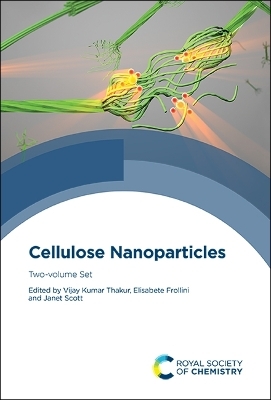
Cellulose Nanoparticles
Royal Society of Chemistry
978-1-78801-799-2 (ISBN)
- Keine Verlagsinformationen verfügbar
- Artikel merken
Cellulose nanoparticles (CNP) are a class of bio-based nanoscale materials, which are of interest due to their unique structural features and properties such as biocompatibility, biodegradability, and renewability. They are promising candidates for applications including in biomedicine, pharmaceuticals, electronics, barrier films, nanocomposites, membranes, and supercapacitors. New resources, extraction procedures and treatments are currently under development to satisfy increasing demands for cost-effective and sustainable methods of manufacturing new types of cellulose nanoparticle-based materials on an industrial scale. This two-volume set covers Cellulose Nanoparticles: Chemistry and Fundamentals and Cellulose Nanoparticles: Synthesis and Manufacturing. Written by an international collection of contributors in the field, these books form a useful reference work for graduate students and researchers in chemistry, materials science, nanoscience and green nanotechnology.
Prior to commencing at Cranfield University, Dr Thakur worked as a Staff Scientist in the School of Mechanical and Materials Engineering at Washington State University, US. He was also a Research Scientist in Temasek Laboratories at Nanyang Technological University, Singapore, and a Visiting Research Fellow in the Department of Chemical and Materials Engineering at Lunghwa University of Science and Technology, Taiwan. Dr Thakur has published more than 120 SCI journal research articles in the field of chemical sciences / materials science and holds one United States patent. 11 of his research papers have been highlighted as Highly Cited Papers in the Web of Science and three papers have been classed as Hot Papers. He has also published 44 books and 35 book chapters on polymer science / materials science / nanotechnology with numerous publishers. He sits on the editorial board of several WoS Indexed SCI Journals (e.g. Nature Scientific Reports; Ind Crops Prod.; Adv. Polym. Tech.; Nanomaterials; PLOS ONE; Int. J. Polym. Anal. Charact; Polym. Adv. Technol) as an Editor/Editorial Advisory Board member. Prof Elisabete Frollini is the Head of the Macromolecular Materials and Lignocellulosic Fiber Group, and is currently the coordinator of the Center for Research on Science and Technology of BioResources (Institute of Chemistry of Sao Carlos, University of Sao Paulo, Sao Carlos, Sao Paulo, Brazil), Editor-in-Chief of Industrial Crops and Products and Member of the Editorial Board of Cellulose. She has expertise in bio-based polymeric materials (including ultrathin- and nanofibers) from biomass with an emphasis on lignocellulosic biomass, which has also been used within the scope of biorefinery. Janet L. Scott is Professor of Sustainable Chemistry in the Department of Chemistry and Training Director of the EPSRC Centre for Doctoral Training on Sustainable Chemical Technologies at the University of Bath. Educated in South Africa (PhD University of Cape Town, 1995), she has a background in both industry and academia in three countries: South Africa, Australia and the United Kingdom. Janet is a Fellow of the Royal Society of Chemistry (from 2004), a Titular Member of Division III of the International Union of Pure and Applied Chemistry (IUPAC) and Secretary of the Interdivisional Committee on Green Chemistry for Sustainable Development (IUPAC ICGCSD). Her current research focus is on sustainable materials, particularly those derived from abundant and renewable biopolymers such as cellulose and she works closely with computational chemists, electrochemists, chemical and tissue engineering experts, physicists, mechanical engineers and even architects on a range of interdisciplinary projects including projects funded by the EPSRC, Innovate UK and the European Union's H2020 programme. All projects include industrial partners as the conversion of research into sustainable materials into real products, that impact directly on the development of more sustainable products and goods, is deemed important.
Cellulose Nanoparticles: Fundamentals; Cellulose Nanoparticles based Functional Materials; Cellulose Nanoparticles: Extractions; Characterization of Cellulose Nanoparticles; Nanocellulose: Extraction, Surface Functionalization and Potential applications; Engineering and surface modification of cellulose nanoparticles and their characterization; Surface Modification and Characterization of Nanocellulose for Functional Materials; Electrospinning suspensions of cellulose nanocrystals and nanofibers; Spectroscopic Characterization of Cellulose Nanoparticles; CNP enhanced green composites; Nanocellulose in biomimicking materials systems; Thermal Characterization of Cellulose Nanoparticle based Advanced Materials; Rheological Characterization of Cellulose Nanocrystal Stabilized Emulsions; Scattering Studies of Cellulose Nanoparticle Based Advanced Materials Introduction; CNP-enhanced Membranes; CNP based Coatings: Chemistry; Assembly of Cellulose Nanoparticles; "Smart" Wood -like Materials Based on Cellulose Nanoparticles; 3D printing using Cellulose Nanoparticles; Additive manufacturing of nanocellulose based soft composite materials for advance applications; Cellulose Nanoparticle Derived Films; Smart" Materials Based on Cellulose Nanoparticles; Nanocellulose Based Smart Hydrogels; Agro-cellulose based carbon nanotubes; Cellulose nanofibre based biodegradable polymers and bio-nanocomposites: Structure and chemistry; Safety and Envioronmental Aspects of CNPs; Cellulose nanoparticles as rubber reinforcement; Manufacturing of Cellulose Nanoparticle Based Advanced Materials; Polymer composites with high filler content of cellulose nanoparticles; Cellulose Nanoparticles/Polysaccharide-type Polymer Based Materials; Fabrication of biodegradable cellulose composite through greener reaction process; CNP/Thermosetting Polymer Based Nanocomposites; CNP based gel materials; Cellulose Nanoparticle Based Flexible Advanced Materials; Electrospinning of Nanocellulose for Advanced Nanocomposite Materials; CNP based Hybrid Advanced Materials; Fully Biodegradable Cellulose Nanoparticles based Advanced Materials; Morphological Analysis of CNP based Advanced Materials; Structural and Morphological Characterization of Cellulose Nanoparticle Based Advanced Materials; Mechanical Characterization of Cellulose Nanoparticle Based Advanced Materials; DMA Study of Cellulose Nanoparticle Based Advanced Materials; Viscoelastic Properties of Cellulose Nanoparticle Based Advanced Materials; Graphene oxide-cellulose nanocrystal (GO-CNP) Based Advanced Materials; In-Situ Polymerized Cellulose Nanoparticle Based Advanced Materials; Cellulose Nanoparticle Based Advanced Materials for Energy Storage; Physico-chemical Properties of Cellulose Nanoparticle Based Advanced Materials; Life cycle assessment of Cellulose Nanoparticle Based Advanced Materials; Cellulose Nanoparticle Based Advanced Materials for Optical Sensors, Technology and Applications; CNP Based Advanced Polymer Nanocomposites; Thermal properties and future prospects of nanocellulose and their composites
| Erscheint lt. Verlag | 9.7.2021 |
|---|---|
| Zusatzinfo | No |
| Verlagsort | Cambridge |
| Sprache | englisch |
| Maße | 156 x 234 mm |
| Themenwelt | Naturwissenschaften ► Chemie |
| Technik ► Maschinenbau | |
| Technik ► Umwelttechnik / Biotechnologie | |
| ISBN-10 | 1-78801-799-4 / 1788017994 |
| ISBN-13 | 978-1-78801-799-2 / 9781788017992 |
| Zustand | Neuware |
| Informationen gemäß Produktsicherheitsverordnung (GPSR) | |
| Haben Sie eine Frage zum Produkt? |
aus dem Bereich


